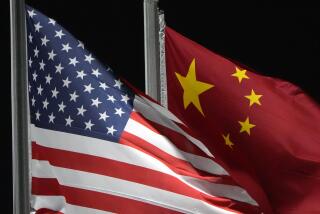Disturbed by Missiles, U.S. Cuts China Sales
WASHINGTON â The United States, disturbed by Chinaâs sale of Silkworm missiles to Iran, moved today to limit the sale of some high-technology items to the Chinese.
It was the first economic step against China since the United States began urging China months ago not to sell the missiles to Iran. In the last week, the Iranians have used two of the Chinese-built weapons to hit targets in the Persian Gulf.
Under the policy announced today by State Department spokeswoman Phyllis Oakley, the United States has halted an ongoing process of liberalizing the types of high technology that U.S. companies can sell to China.
Computers, Lasers
That means computers, semi-conductor manufacturing equipment, laser producing machinery, and telecommunications products that were on lists of non-exportable items will remain on those lists and any Chinese requests for the products will not be filled.
âDuring this period of rising tensions . . . we have decided not to proceed for now with review of certain liberalization of high-technology export controls on the Peopleâs Republic of China,â Oakley said.
Other State Department officials, speaking on condition of anonymity, said it is unlikely any Chinese military or consumer production programs would be hurt by the shutdown of the liberalization process. Indeed, the purpose of the decision was not to hurt the Chinese economy, but to signal U.S. displeasure about the Silkworms, they said.
Earlier this year, during a trip to China, Secretary of State George P. Shultz urged the Chinese to cancel plans to sell the weapons to Iran. The request was based on U.S. fears that the weapon--an anti-ship missile with a range of up to 60 miles--would create major threats to shipping in the Persian Gulf.
Despite the U.S. pleas, the missiles have been set up in coastal areas of Iran and occupied Iraq and have been employed in the last week.
More to Read
Sign up for Essential California
The most important California stories and recommendations in your inbox every morning.
You may occasionally receive promotional content from the Los Angeles Times.










